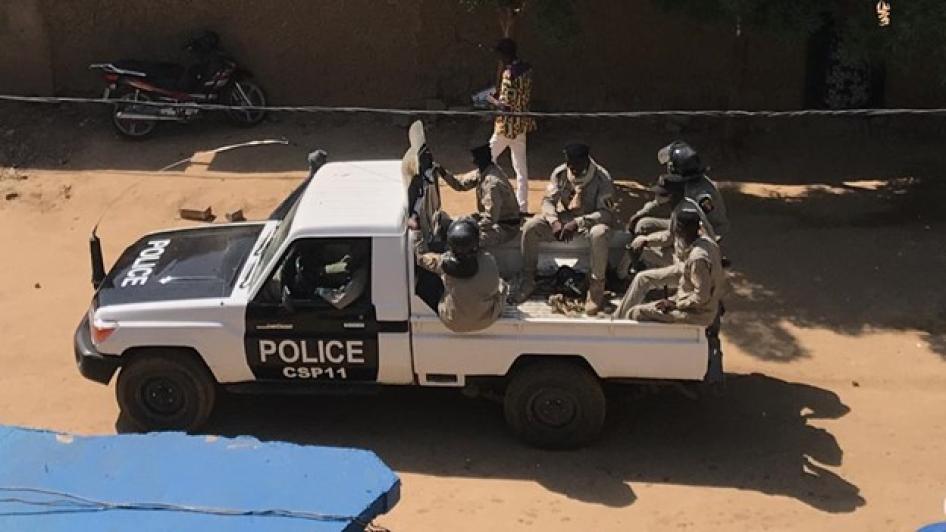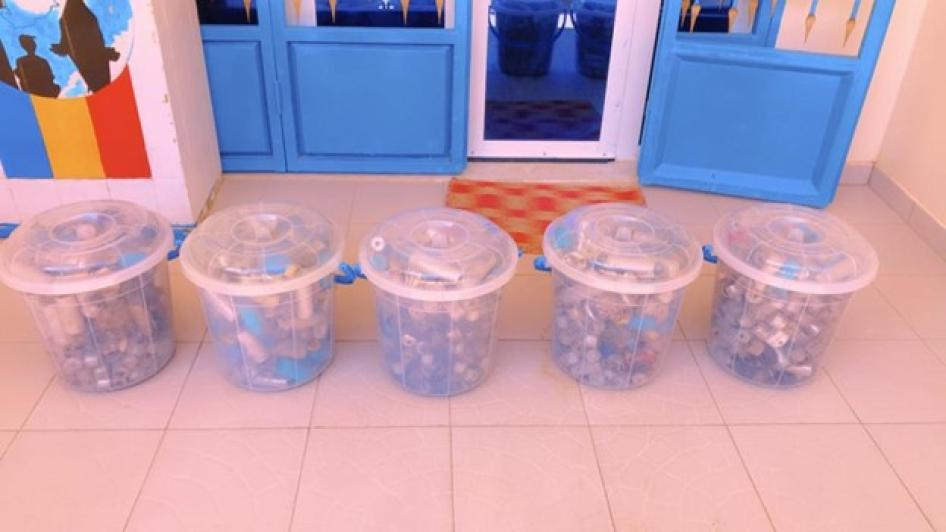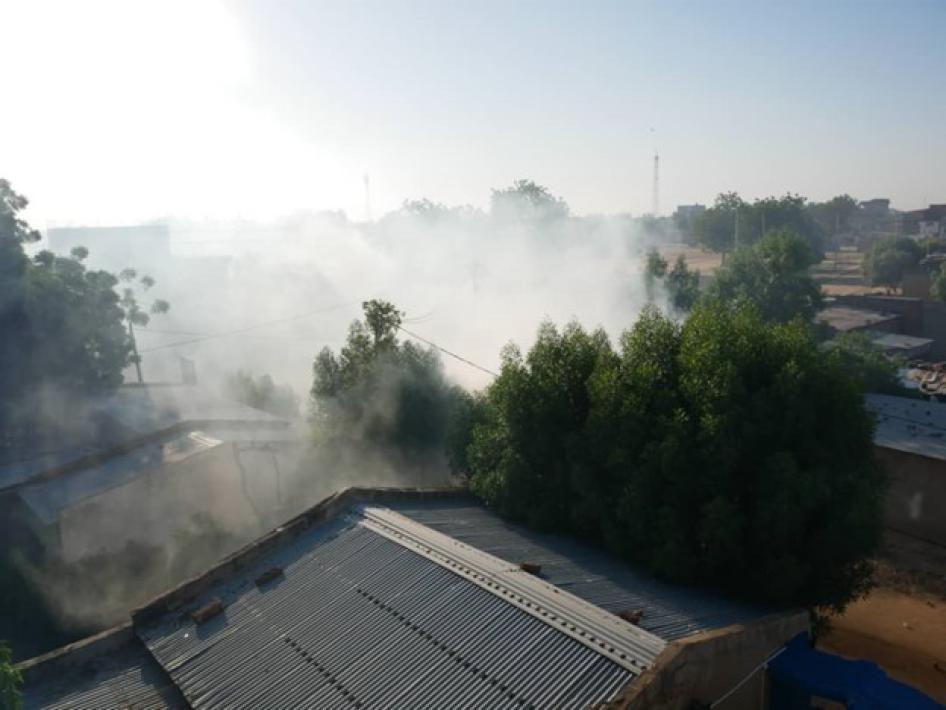(New York) – The Chadian government has failed to take any responsibility for its security forces’ abusive use of force against peaceful protesters in the capital N’Djamena on October 2, 2021, Human Rights Watch said today. The right to peaceful protest came under attack almost immediately after Chad’s Transitional Military Council (Conseil militaire de transition, or CMT), took over in April and imposed a ban on demonstrations.
The CMT, led by Gen. Mahamat Idriss Déby Itno, took control of Chad on April 20, after his father, then-President Idriss Déby Itno, reportedly died during clashes between rebels and government forces. The council announced that it would govern Chad for an 18-month period, which may be renewed once, during which it would organize an inclusive national dialogue, then restore civilian rule through elections. That series of nationwide discussions is expected to start in November or December and culminate in presidential elections between June and September 2022.
“Six months after the Transitional Military Council came to power, civic space continues to be largely closed, peaceful protests are still violently repressed, and security forces enjoy impunity,” said Ilaria Allegrozzi, senior Africa researcher at Human Rights Watch. “The CMT should end its assault on dissenters and protesters and ensure that security forces implicated in rights abuses are held accountable.”
The CMT should stop security forces’ use of excessive force against peaceful protesters and ensure justice for victims of security force violence, including opposition figures.
In April and May hundreds of members and supporters of opposition parties and civil society organizations united under the Wakit Tamma coalition to protest the ban and demand a transition to civilian rule. Joined by many Chadians, protests were held across the country. The security forces dispersed protests using excessive force, including live ammunition, and killed at least seven people while injuring dozens. Security forces arrested more than 700 people, several of whom told Human Rights Watch that they were tortured and ill-treated in detention.
Between October 3 and 25 Human Rights Watch interviewed by telephone 11 people who were injured by security forces during the October 2 demonstration in N’Djamena. Human Rights Watch also spoke with two opposition party members, a staff member from a civil society organization, a lawyer, a journalist, an activist, and a physician. To corroborate victims’ accounts, Human Rights Watch obtained and analyzed photographs and videos of protesters’ injuries, in addition to medical records issued by health facilities in N’Djamena.
From June through September the authorities took some positive steps, including recognizing the popular opposition movement Les Transformateurs as a political party. On June 10 the authorities released Baradine Berdei Targuio, a prominent human rights defender arrested in January after he posted a Facebook message about President Déby’s alleged poor health. Thanks to sustained international pressure, the authorities allowed opposition-led demonstrations across Chad during this period.
However, the opposition, including Wakit Tamma, have continued to express concern about the military authorities’ perceived grip on power.
On October 2 hundreds of N’Djamena residents joined members and supporters of Wakit Tamma to protest the CMT’s rule and seek amendments to Chad's transitional charter. Although the authorities had authorized this demonstration, Human Rights Watch found that the anti-riot police – and in one case, gendarmes – fired teargas canisters, rubber bullets, and potentially live ammunition at the protesters, injuring about 40 to 45 people and damaging private property.
Some of those interviewed said that they had either been injured, had seen others injured, or had heard live ammunition. A 34-year-old opposition party supporter who said he was hit by a live bullet said: “I heard many gunshots and before I realized it, I fell on my knees, my trousers were torn, and I was bleeding from my right thigh.”
Human Rights Watch did not have access to images or footage of casings from live ammunition to corroborate whether some of the gunshots were from live ammunition, or if all could have been rubber bullets or other forms of less-lethal weapons. Human Rights Watch has reviewed images of many cartridges from less-lethal weapons including rubber bullets and teargas, collected after the security forces used force against the protesters.
“The police who abused protesters in April are the same who abused us now,” said a 42-year-old local civil society activist injured during the October 2 demonstration. “There has been no justice, no accountability. Those who are in power think they are above the law.”
In an October 2 news release, the public security and immigration minister, Souleyman Abakar Adoum, said that protesters did not follow the authorized itinerary for their demonstration and accused them of “disturbing the public order.” On October 4 Communications Minister Abdraman Khoulamallah said on state television that 12 members of the security forces were injured and 12 of their vehicles damaged by stones thrown by protesters, whom he called “irresponsible” people wanting to start a rebellion. He said that no one was seriously injured except one shop owner. The minister acknowledged that security forces had used teargas, but said that only one person was injured. He did not address the use of rubber bullets and live ammunition.
Contacted by Human Rights Watch on October 14 via email and on October 19 via SMS, the justice minister Mahamat Ahmat Alhabo did not respond.
In a move that raises concerns and risks further fueling the culture of impunity for serious human rights abuses, on October 14, Mahamat Idriss Déby appointed Abdel Kader Mahamat, known as Baba Laddé, former leader of the rebel group Popular Front for Redress (Front Populaire pour le Redressement - FPR), as the new director of Chadian intelligence services. Baba Laddé and his armed group have fought in the Central African Republic since 2018. The United Nations (UN) and national and international human rights groups have documented serious human rights crimes by Baba Laddé’s men there, including rape, killings, and looting.
International law, African human rights law, including the African Charter on Human and Peoples' Rights, and Chad’s transitional charter enshrine the rights to freedom of expression and assembly, and prohibit excessive use of force by law enforcement officials. Under the United Nations Basic Principles on the Use of Force and Firearms, security forces may use force only in proportion to the seriousness of the offense, and the intentional use of lethal force is permitted only when strictly unavoidable to protect life.
On October 23 Wakit Tamma’s coordinator, Max Loalngar, announced that on November 6 Wakit Tamma will hold a meeting in N’Djamena to let the population know about “its actions in favor of democracy,” and will organize another march for November 13.
“The CMT needs to reverse course in the transition period’s final year and in addition to respecting and protecting Chadians’ right to peaceful protest, should create rights-respecting channels to engage with their concerns” Allegrozzi said. “Failure to do so will only bolster Chad’s culture of violent repression and impunity for abusers.”
For more details and accounts from victims and witnesses, please see below.
The Transitional Military Council
On April 20 a Chadian army spokesman announced on national television that President Idriss Déby Itno had died of injuries suffered in clashes between rebels and government forces. At this time, the CMT took control, and its leader, Gen. Mahamat Idriss Déby Into, promised that Chad would hold free and transparent elections within 18 months.
On April 26 the CMT named Albert Pahimi Padacke, a civilian politician, as prime minister and tasked him with forming a transitional government, which was appointed on May 2.
On July 29 the Council of Ministers adopted a roadmap for the transition. Based on this timeline, the inclusive national dialogue will occur in November or December, and elections will be held between June and September 2022.
In a September 24 decree, General Déby named 93 members of a National Transitional Council, to act as the interim parliament until the elections. The main opposition coalition, Wakit Tamma, has criticized the composition of this body, which includes at least 30 percent members of the previous National Assembly, 30 percent women, and 30 percent young people, but no members of Wakit Tamma.
Les Transformateurs, the recognized political party that is part of the Wakit Tamma coalition, continues to call for revisions to the transitional charter that would prevent the transition period from being renewed beyond 18 months and would bar CMT members from running in the elections.
October 2 Crackdown N’Djamena
The 10 victims interviewed described the security forces’ violent repression.
A 28-year-old member of Wakit Tamma said that anti-riot police teargassed hundreds of peaceful protesters in the Chagoua neighborhood, injuring her and several others:
Police fired teargas from their vehicles. They were at about 100 meters from us ... A teargas canister hit me in the abdomen and another one on my left cheek. Wakit Tamma members helped me and took me to the headquarters of the opposition party Les Transformateurs, where a nurse treated me. I didn’t go to the hospital because I have no money to pay for medical care. The wounds still hurt, and I am not feeling well.
Human Rights Watch also reviewed a video, filmed by a local activist on October 2, that shows the victim’s wounds.
A 42-year-old local civil society activist described being teargassed and shot in N’Djamena’s Chagoua neighborhood:
Our demonstration had been authorized by the authorities, but to our big surprise, the anti-riot police and gendarmes came to disperse us with violence. They came and fired teargas, a lot of teargas. People were choking, they couldn’t breathe. I struggled to breathe. I ran to the other side of the road and took shelter in a shop where a shop owner was giving water to the demonstrators. I wet my mask and washed my face. The police and gendarmes were pursuing us. A vehicle of the gendarmes came. A gendarme fired at me. He was about 20 meters from me. I initially thought he wanted to fire in the air, but he fired directly at me. A rubber bullet hit me in the chest and another one hit me in the head. I fell to my knees.
After receiving medical assistance, he shared his experience and denounced the security forces’ abuses on the radio station FM Liberté. Human Rights Watch corroborated his account by analyzing his medical records, issued by a private health clinic in N’Djamena on October 2, as well as two photographs of his wounds.
A 35-year-old mechanic who supports Les Transformateurs said that anti-riot police fired teargas, at close range, at him and other demonstrators in Chagoua neighborhood at about 7:30 a.m.
He [a policeman] was in a police vehicle some 30 meters away from me. He fired a teargas canister at me and the other protesters. The canister hit my left foot. I fell, and a man helped me escape and find my way to the headquarters of my party, which was nearby. A nurse treated me there, but I didn’t go to the hospital due to a lack of financial means. Now, I use a crutch and cannot walk long distances. My foot hurts and is swollen.
Human Rights watch reviewed a photograph, sent by the mechanic, of his foot wrapped in bandages.
Bystanders were affected by the violence as well. One 56-year-old shop owner who was not protesting said:
I just found myself at the wrong place at the wrong time. I was not among the demonstrators. I never took part in any demonstration. My shop just happens to be in the same neighborhood, Chagoua, where the October 2 march took place. I was in front of my shop with my son when three anti-riot police vehicles arrived. One parked in front. As I was closing the door of my shop, a policeman fired … at me. I was hit on both of my arms. The police took me first to the police station in the 7th district and then to the hospital. My right arm is fractured.
Human Rights Watch received two photographs from the victim showing injuries to left elbow, and his bandaged right arm and hand.
Medical records issued by a doctor at the Amitié hospital in N’Djamena on October 3, and shared by the victim with Human Rights Watch, state that the shop owner’s right arm was injured by gunshot. Human Rights Watch spoke to the medical doctor who treated the shop owner and issued the medical records. He said: “It was a clear gunshot wound in the right humerus. There was an entry point and an exit point. I did not extract the bullet. I treated the wound, which caused a fracture. The man also suffered another injury, but not by gunshot, on the left elbow.” The shop owner said he was hit by a teargas canister, which may be the cause of the injury to the left arm.
At least three female protesters, two of whom are members of the opposition party Les Transformateurs and one of whom is a Wakit Tamma supporter, said police beat them both in the street and in a police vehicle, where the police held them for some time before letting them go.
A 29-year-old woman said:
They [policemen] caught us, me and two other women, in front of the headquarters of Les Transformateurs. They insulted us and took off the Chadian flag we had wrapped around our heads. They said: “This flag doesn’t belong to you.” I replied the Chadian flag belongs to all Chadians. Then, they beat us with a club and pushed us in their vehicle where they continued to beat us, as well as another young man who had also been caught with us. They beat us with wooden sticks and with the butt of their guns and eventually they let us go, they abandoned us in the streets. I had pain all over my body for several days.
Impunity for Repression of Protests, Security Forces’ Excessive Force
In nearly six months since the April protests, there has been little to no progress toward accountability for security forces’ abuses against peaceful protesters.
Human Rights Watch, and other local and international human rights groups, as well as Chad’s international and regional partners have condemned security forces’ excessive use of force against protesters and called for justice for these violations. Although the Chadian military authorities had promised to investigate killings during the April demonstrations, to Human Rights Watch’s knowledge, no member of the security forces has yet been held accountable.
On May 5 Justice Minister Mahamat Ahmat Alhabo told Radio France Internationale that the N’Djamena “prosecutor must open an investigation” into the arrests, deaths, and injuries of protesters during the April 27 and 28 demonstrations. In a June 27 interview with Jeune Afrique, the head of the CMT, Mahamat Idriss Déby Into, said that an investigation had been opened, also adding that he believed the violence “came more from minority elements whose purpose was to wreak havoc rather than from the police itself.”
Since the October 2 demonstration in N’Djamena, the authorities have not made any public statements about opening an investigation into the harm suffered by protesters and bystanders, and the damage to private property at the hands of the security forces. Instead, the authorities, while not denying that the security forces deployed teargas, have failed to address the use of rubber and live bullets, blamed the protesters, and claimed that the security forces injured only one person, a shop owner.
Since the October 2 march, Chad has slid further into repression and the suppression of the rights to freedom of expression and assembly. In an October 6 communication to the immigration and public security minister, Wakit Tamma said it had planned a demonstration for October 9, again in N’Djamena. The next day, the minister issued a decree banning the protest, citing potential threats to the public order in light of the events of October 2.










